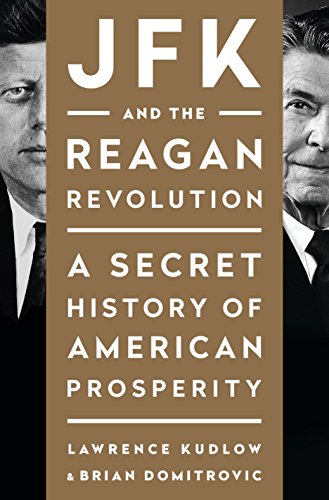Bargain Bin Books
JFK and the Reagan Revolution: A Secret History of American Prosperity
Couldn't load pickup availability
Author: Kudlow, Lawrence
Color: Grey
Edition: Illustrated
Features:
- Portfolio
Number Of Pages: 256
Details:
The fascinating, suppressed history of how JFK pioneered supply-side economics. John F. Kennedy was the first president since the 1920s to slash tax rates across-the-board, becoming one of the earliest supply-siders. Sadly, today’s Democrats have ignored JFK’s tax-cut legacy and have opted instead for an anti-growth, tax-hiking redistribution program, undermining America’s economy. One person who followed JFK’s tax-cut growth model was Ronald Reagan. This is the never-before-told story of the link between JFK and Ronald Reagan. This is the secret history of American prosperity. JFK realized that high taxes that punished success and fanned class warfare harmed the economy. In the 1950s, when high tax rates prevailed, America endured recessions every two or three years and the ranks of the unemployed swelled. Only in the 1960s did an uninterrupted boom at a high rate of growth (averaging 5 percent per year) drive a tremendous increase in jobs for the long term. The difference was Kennedy’s economic policy, particularly his push for sweeping tax-rate cuts. Kennedy was so successful in the ’60s that he directly inspired Ronald Reagan’s tax cut revolution in the 1980s, which rejuvenated the economy and gave us another boom that lasted for two decades. Lawrence Kudlow and Brian Domitrovic reveal the secret history of American prosperity by exploring the little-known battles within the Kennedy administration. They show why JFK rejected the advice of his Keynesian advisors, turning instead to the ideas proposed by the non-Keynesians on his team of rivals. We meet a fascinating cast of characters, especially Treasury Secretary Douglas Dillon, a Republican. Dillon’s opponents, such as liberal economists Paul Samuelson, James Tobin, and Walter Heller, fought to maintain the high tax rates—including an astonishing 91% top rate—that were smothering the economy. In a wrenching struggle for the mind of the president, Dillon convinced JFK of the long-term dangers of nosebleed income-tax rates, big spending, and loose money. Ultimately, JFK chose Dillon’s tax cuts and sound-dollar policies and rejected Samuelson and Heller. In response to Kennedy’s revolutionary tax cut, the economy soared. But as the 1960s wore on, the departed president’s priorities were undone by the government-expanding and tax-hiking mistakes of Presidents Johnson, Nixon, Ford, and Carter. The resulting recessions and the “stagflation” of the 1970s took the nation off its natural course of growth and prosperity-- until JFK’s true heirs returned to the White House in the Reagan era. Kudlow and Domitrovic make a convincing case that the solutions needed to solve the long economic stagnation of the early twenty-first century are once again the free-market principles of limited government, low tax rates, and a strong dollar. We simply need to embrace the bipartisan wisdom of two great presidents, unleash prosperity, and recover the greatness of America.
Reviews:
“To some degree, this book is a work of humility...And it’s easy to read this as a recommendation that Donald Trump emulate JFK as he pursues tax reform.”
— The National Review
“The authors should be cheered for what they’ve done…Larry Kudlow and Brian Domitrovic have thankfully written an essential history that will hopefully remind readers of all stripes that low taxes and sound money are good for freedom and prosperity, and happily are the property of both major political parties.”
— John Tammy, Forbes.com
“The authors make a thought-provoking argument that the same economic strategy would solve the economic problems in our nation today. Moreover, they believe it would solve other problems, such as inequality and damage to the environment…Recommend[ed] for those who appreciate economic theory and/or 20th-century history.”
— Library Journal
“Economic growth: What a great idea! Now, if only we could get the Democrats to agree that growth is a good idea, and if on...
EAN: 9781595231147
Release Date: 06-09-2016
Languages: English
Item Condition: New
Binding: Hardcover
Share


